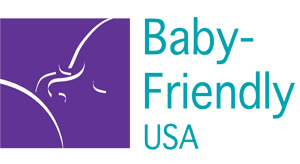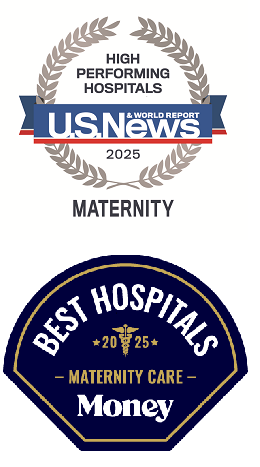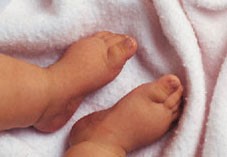 As you plan for your new arrival, you can be assured that Cooper is the best place to have your baby. We offer a private, comfortable, pleasant atmosphere for prenatal care, delivery, and aftercare. Cooper University Hospital is also a Regional Perinatal Center, which means that we have the ability to meet any need that might occur during your pregnancy or following the birth of your baby.
As you plan for your new arrival, you can be assured that Cooper is the best place to have your baby. We offer a private, comfortable, pleasant atmosphere for prenatal care, delivery, and aftercare. Cooper University Hospital is also a Regional Perinatal Center, which means that we have the ability to meet any need that might occur during your pregnancy or following the birth of your baby.
Prenatal Care
 Cooper offers extensive prenatal care in our Antepartum Diagnostic Center as well as an array of Childbirth and Family Education classes, including childbirth classes, Labor and Delivery tours, breastfeeding education, and more.
Cooper offers extensive prenatal care in our Antepartum Diagnostic Center as well as an array of Childbirth and Family Education classes, including childbirth classes, Labor and Delivery tours, breastfeeding education, and more.
Our childbirth preparation webinar series is live from the comfort of your home. The series is designed to provide you with a better understanding of the labor and delivery process, help you feel more confident in caring for your new baby, introduce breastfeeding techniques, and more. A one-time cost of $50 includes four live webinars: Labor, Breastfeeding, Postpartum, and Infant Care. For more information on our childbirth class series, please contact our Lactation team at 856.342.3283.
Antepartum Diagnostic Center (ADC)
The Antepartum Diagnostic Center is a special area where various professionals, including nurses and doctors, perform tests such as fetal ultrasound, non-stress tests, biophysical profiles, genetic counseling, and amniocentesis. These tests are used to determine the well-being of your baby before birth. Our center has three ultrasound rooms, one non-stress testing room, one genetic counseling room, one physician consultation room, and a separate waiting area.
Labor and Delivery

Our focus is on family-centered care. We offer birthing suites for your labor and delivery experience, and encourage moms and their infants to stay together through the remainder of the hospital stay.
In the Labor and Delivery area, patients are cared for in a setting that can handle any situation, from the uncomplicated pregnancy to one that falls into the high-risk category.
Our Labor and Delivery suite includes six private labor and delivery rooms, one isolation labor and delivery room, three labor and delivery triage rooms, two operating rooms, and a comfortable waiting area for families.
Primary nursing is emphasized at Cooper, meaning that as much as possible, the same nurse will care for you during your stay in Labor and Delivery. Family-centered care is important to us, so we encourage family involvement and support throughout your hospital stay. Whether you have a vaginal delivery or a caesarean section, you will not need to be moved to a different area of the hospital. Everything can be done for you in our Labor & Delivery area. An anesthesiologist is available 24 hours a day, seven days a week to help with pain management and caesarean sections.
Here are a few things to consider when deciding it is time to go to the hospital:
- If your pregnancy is at full term and your contractions are coming at regular intervals so that they can be timed for one hour at five minutes apart and last for approximately 30 to 40 seconds.
- If your water breaks, regardless of whether you are having contractions. This could be either a gush of fluid or a small dribble.
- If you experience bright red bleeding.
- If it not necessary to call if you are having irregular contractions. You may have false labor pains, which are usually irregular and after a while will dwindle or stop. True labor pains establish a regular pattern, with the contractions becoming closer and stronger. You may note a “bloody” show or “mucus plug”. However, you do not need to call unless your water breaks or you have regular contractions as noted above.
- When your water breaks or labor begins, avoid solid food. You may drink clear fluids and eat hard candy. Keep yourself well hydrated.
- On arrive at the hospital, go to the Emergency Department.
Maternal Fetal Care Unit (MFCU)
The Maternal Intermediate Care Unit is dedicated to the care of patients who are preparing for delivery and those who have already gone through the delivery process. Patients in this nine-bed unit have medical conditions or problems with a complicated pregnancy, like premature labor or diabetes.
A caring staff of professional nurses is available to guide and support patients and families through these very important days. They will provide all the essential teaching needed, through personal instruction, video, and written material.
Maternal/Infant Unit
Our family-centered Maternal/Infant Unit offers you and your baby a welcoming and comfortable environment so you can get to know one another while nurses support you in caring for the latest addition to your family. The unit provides sleeping accommodations for a support person and offers extended visiting hours to your designated family as well as brothers and sisters of the baby. Our unit features a family lounge, which provides a comfortable setting for visitors.
A supportive staff of professional nurses will guide and support your new family through these first, very important days. In addition, frequent visits by a lactation consultants to help mother’s master breastfeeding if desired. Through the combined efforts of the nursing and medical staff, we hope to make your transition into your new family life the beginning of many happy days to come.
Transport Services
In the event that an expectant mother or infant needs to be admitted to our Level III facility, transport service is provided by Cooper University Hospital. A team of highly trained professionals is available 24 hours a day to transport mother or infant, via emergency medical transport vehicle, when and if necessary.
Neonatal Intensive Care Unit

Our Neonatal Intensive Care Unit is a Level III facility, featuring 25 intensive care beds, two isolation nurseries, and a nine-bed transitional nursery. Our nurseries are equipped to care for any baby who requires special treatment. In addition to babies born at Cooper, many infants are transported in from other hospitals for specialized care.
While most infants are in the Neonatal Intensive Care Unit (NICU) because of premature birth and related conditions, some are full-term infants born with other medical or surgical problems. Our nurseries are staffed with highly-skilled and experienced professionals, including neonatologists, registered nurses, nurse practitioners, a newborn clinical specialist, pediatricians, and pediatric residents to name a few.
When a baby no longer requires intensive care, he/she may be transferred to one of our nurseries or back to the "home" hospital. Infants in the transitional nursery still require special care, but the focus is on preparing for graduation to home.
Families may request to spend the night with their baby in our "nesting room" prior to discharge, to acquaint themselves with any special equipment or procedures their baby may need at home. Parents are welcome in the Neonatal Intensive Care Unit and Transitional nurseries 24 hours a day.
Aftercare
Cooper is one of the 11 mid-Atlantic training centers for the Newborn Individualized Development Care and Assessment Program (NIDCAP). Within this program, Child Development Specialists observe an infant during caregiving to assess the baby’s degree of health and ability to interact with the environment and his or her caregiver. This information is then used to recommend care giving instructions and suggestions for modifying the child’s development.
When you and your baby are ready for discharge, the case manager and the home care coordinator will work with you and your insurance provider to create a smooth transition home. The Maternal-Child team also provides support for mom and baby after discharge with telephone follow-up or nursing care visits in the Maternal-Child Ambulatory Care Clinic. The Neonatal Follow-Up Clinic continues to provide medical, nursing and developmental follow-up to infants discharged from the Newborn ICU up to 5 years of age.
Staff You May Meet
- Neonatologists - Our team of attending physicians, called neonatologists, are responsible for the primary care of your baby, within the Neonatal Intensive Care Unit. Neonatologists are pediatric physicians with extra training in the care of sick babies. A neonatologists is in the hospital at all times and can answer your medical question about your baby and his or her care.
- Nurses - Our skilled and knowledgeable nursing staff will care for you throughout your hospital stay. These nurses work closely with a clinical nurse specialist to provide expert nursing care for you and your baby. They are available at all times to make sure you are well and comfortable, and to answer any questions you may have.
- Clinical Nurse Specialists - The perinatal clinical nurse specialist and the neonatal clinical nurse specialist have advanced degrees in high-risk obstetrical nursing and neonatal nursing. They are available for consultation and education for both patients and nursing staff.
- Residents - Cooper University Hospital has a residency program in both Obstetrics/Gynecology and Pediatrics. These teams of physicians are in the hospital 24 hours a day, seven days a week, and they work closely with your doctor and the baby's doctor to provide quality care for you and your family.
- Clinical Nurse Managers - There is a clinical nurse manager for obstetrical services and a clinical nurse manager for newborn services. They are responsible for pursuing the highest quality of care for you and your family.
- Genetic Counselors - Genetic counselors work with a person or family that may be at increased risk for an abnormal pregnancy outcome. These are health care professionals experienced in providing information, counseling, and support to help families make personal decisions about pregnancy and child care. After reviewing the family history and medical background, they may arrange for the patient to have special tests or help them interpret medical information about any risks present. When necessary, counselors will refer families to resources in the community that focus on a specific genetic condition such as pediatricians, pediatric surgeons, education specialists, and family support groups.
- Lactation Consultant - Cooper University Hospital has the support services of a full-time breast feeding specialist available to all families who would like information about breast feeding before and after delivery. Services include visits to moms in the hospital, education, referrals to community resources, breast pump rental information, and follow-up phone calls.
- Pastoral Care - Clergy of various faiths are available through the pastoral care office. A group of ordained and lay pastoral care volunteers regularly visits within the hospital. Our non-denominational chapel is located on the main floor.
- Perinatal Educator - The perinatal educator coordinates childbirth and family education activities. In addition, individual childbirth education classes, video tapes, audio tapes, and reading materials are available for the extended bed rest patient.
- Respiratory Therapists - A respiratory therapists is a specialist in respiratory treatments. They are also responsible for the oxygen or ventilator equipment that your baby may need.
